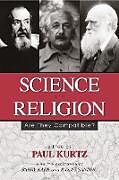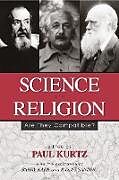Science and Religion
Einband:
Kartonierter Einband
EAN:
9781591020646
Untertitel:
Are They Compatible?
Genre:
Philosophie & Religion
Autor:
Paul Kurtz
Herausgeber:
Globe Pequot Press
Anzahl Seiten:
368
Erscheinungsdatum:
01.04.2003
ISBN:
978-1-59102-064-6
Zusatztext "This is strong stuff... An important counterweight to the accommodationism that has dominated recent discourse." -- Times Literary Supplement "Every possible argument about this question seems to be here...stimulating and possibly subversive to some." -- New Scientist "An enjoyable buffet for interested readers. . . Recommended." -- Choice ". ..reader-friendly...provide[s] diversified views on topics of much interest today." -- Albuquerque Journal "Rich and suggestive essays by such well-known thinkers as Daniel Dennett! Richard Dawkins and Arthur C. Clarke range over topics from intelligent design to sociobiology and creationism. ... important and provocative voices too often drowned out by the move to assert complete compatibility between science and religion." -- Publishers Weekly Informationen zum Autor Edited by Paul Kurtz - Contributions by Barry Karr and Ranjit Sandhu Klappentext In recent years a noticeable trend toward harmonizing the distinct worldviews of science and religion has become increasingly popular. Despite marked public interest! many leading scientists remain skeptical that there is much common ground between scientific knowledge and religious belief. Indeed! they are often antagonistic. Can an accommodation be reached after centuries of conflict? In this stimulating collection of articles on the subject! Paul Kurtz! with the assistance of Barry Karr and Ranjit Sandhu! have assembled the thoughts of scientists from various disciplines. Among the distinguished contributors are Sir Arthur C. Clarke (author of 2001: A Space Odyssey ! and numerous other works of science fiction); Nobel Prize Laureate Steven Weinberg (professor of physics at the University of Texas at Austin); Neil deGrasse Tyson (Princeton University astrophysicist and director of the Hayden Planetarium); James Lovelock (creator of the Gaia hypothesis); Kendrick Frazier (editor of the Skeptical Inquirer ); Steven Pinker (professor of psychology at MIT); Richard Dawkins (zoologist at Oxford University); Eugenie Scott (physical anthropologist and executive director of the National Center for Science Education); Owen Gingerich (professor of astronomy at Harvard University); Martin Gardner (prolific popular science writer); the late Richard Feynman (Nobel Prize-winning physicist) and Stephen Jay Gould (professor of geology at Harvard University); and many other eminent scientists and scholars. Among the topics discussed are the Big Bang and the origin of the universe! intelligent design and creationism versus evolution! the nature of the "soul!" near-death experiences! communication with the dead! why people do or do not believe in God! and the relationship between religion and ethics. Zusammenfassung Despite marked public interest, many leading scientists remain sceptical that there is common ground between scientific knowledge and religious belief. This book discusses topics such as the Big Bang and the origin of the universe, the nature of the 'soul', and near-death experiences....
Autorentext
Edited by Paul Kurtz - Contributions by Barry Karr and Ranjit Sandhu
Klappentext
In recent years a noticeable trend toward harmonizing the distinct worldviews of science and religion has become increasingly popular. Despite marked public interest, many leading scientists remain skeptical that there is much common ground between scientific knowledge and religious belief. Indeed, they are often antagonistic. Can an accommodation be reached after centuries of conflict?
In this stimulating collection of articles on the subject, Paul Kurtz, with the assistance of Barry Karr and Ranjit Sandhu, have assembled the thoughts of scientists from various disciplines. Among the distinguished contributors are Sir Arthur C. Clarke (author of 2001: A Space Odyssey, and numerous other works of science fiction); Nobel Prize Laureate Steven Weinberg (professor of physics at the University of Texas at Austin); Neil deGrasse Tyson (Princeton University astrophysicist and director of the Hayden Planetarium); James Lovelock (creator of the Gaia hypothesis); Kendrick Frazier (editor of the Skeptical Inquirer); Steven Pinker (professor of psychology at MIT); Richard Dawkins (zoologist at Oxford University); Eugenie Scott (physical anthropologist and executive director of the National Center for Science Education); Owen Gingerich (professor of astronomy at Harvard University); Martin Gardner (prolific popular science writer); the late Richard Feynman (Nobel Prize-winning physicist) and Stephen Jay Gould (professor of geology at Harvard University); and many other eminent scientists and scholars.
Among the topics discussed are the Big Bang and the origin of the universe, intelligent design and creationism versus evolution, the nature of the "soul," near-death experiences, communication with the dead, why people do or do not believe in God, and the relationship between religion and ethics.
Zusammenfassung
Despite marked public interest, many leading scientists remain sceptical that there is common ground between scientific knowledge and religious belief. This book discusses topics such as the Big Bang and the origin of the universe, the nature of the 'soul', and near-death experiences.

Leider konnten wir für diesen Artikel keine Preise ermitteln ...
billigbuch.ch sucht jetzt für Sie die besten Angebote ...
Die aktuellen Verkaufspreise von 6 Onlineshops werden in Realtime abgefragt.
Sie können das gewünschte Produkt anschliessend direkt beim Anbieter Ihrer Wahl bestellen.
Loading...
Die aktuellen Verkaufspreise von 6 Onlineshops werden in Realtime abgefragt.
Sie können das gewünschte Produkt anschliessend direkt beim Anbieter Ihrer Wahl bestellen.
| # | Onlineshop | Preis CHF | Versand CHF | Total CHF | ||
|---|---|---|---|---|---|---|
| 1 | Seller | 0.00 | 0.00 | 0.00 |
